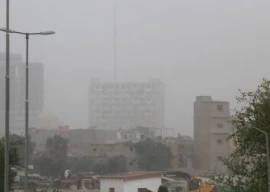
A majority of the patients are children and diseases that have spread the fastest are chest infections, fever, influenza and skin disorders.
The displacement of a myriad of people from their homes in flood-hit areas is also being cited amongst the causes of the spread.
Sakina Bibi is a resident of Dadahara area of the valley’s Barikot district. Her son is admitted in the children’s ward of the government-owned Saidu Group of Hospitals owing to a chest infection.
“My son developed the infection due to the continuous drought. We have brought him here but there are many patients and not enough space, which is hindering proper treatment,” she said while talking to The Express Tribune.
Rahim, a resident of Kokarai area, had also taken his son to a government hospital where he said he was not satisfied with the treatment.
He said that 80 per cent of the patients were children and most of them complained of chest infections.
A patient who moved to a private hospital from a government one told The Express Tribune that doctors in public hospitals did not behave well and the hospitals were not clean either.
“Also, patients would have to buy medicines on their own, so comparatively, private hospitals are better where every facility is available to patients.”
When contacted, the Out-Patient Department (OPD) Officer of the Saidu Group of Hospitals refuted the claims.
“We are trying our best to reach every patient even though the number has increased threefold in the past few days due to the dry weather,” he said.
He said most people were convinced that private hospitals were better than government hospitals. “I suggest that everyone should come to government hospitals as the best professionals are available there,” he said.
Dr Lal Noor Afridi, medical officer of the Saidu hospitals, said the hospitals’ capacity was overstretched. “If you see the OPD record, the number of the patients increased threefold this year.
The children’s ward in particular is overcrowded with two patients sharing one bed. Normally, the number of the patients in the winter season decreases.”
He said that free medicines were available to patients but only to those who had been admitted, not common OPD patients.
Afridi said one of the causes of the spread was the displacement of the flood-hit people. “Many of them are living in tents, so they are exposed to dry and cold weather.
“Some of them are living with their relatives, which is increasing the spread of contagious diseases.”
Published in The Express Tribune, December 20th, 2010.

















COMMENTS
Comments are moderated and generally will be posted if they are on-topic and not abusive.
For more information, please see our Comments FAQ